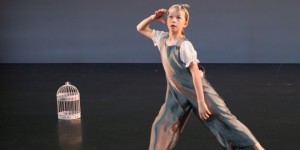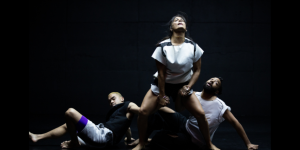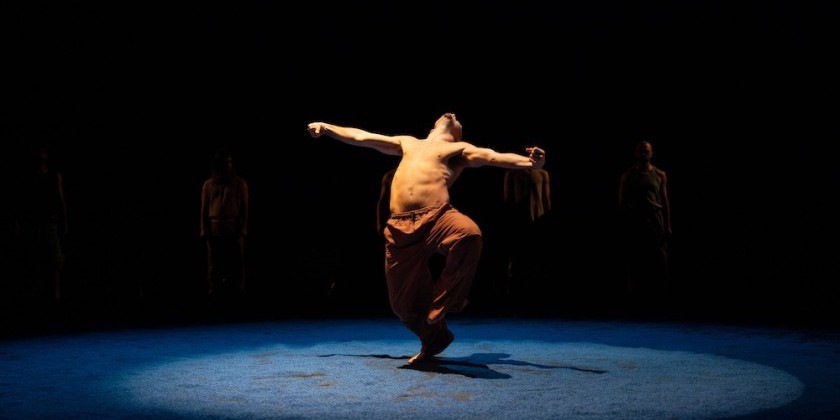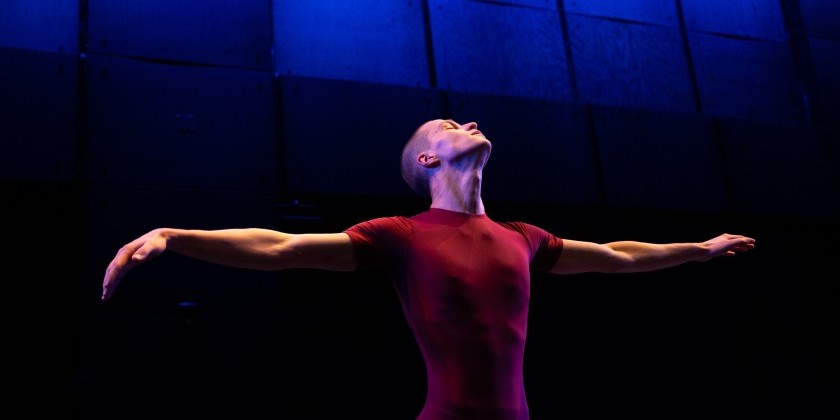IMPRESSIONS: Makini's "TERRESTRIAL: The Sprout" at New York Live Arts

Bill T. Jones New York Live Arts presents TERRESTRIAL: The Sprout
Concept, Direction, Choreography, Film, Song and Performance by Makini
Co-direction, Production Management, Performance and Portuguese/Spanish Interpretation by Nefertiti Charlene Altán
Co-direction, Scripts, Performance, Graphic Design and Social Media Content Creation by Anderson Fliciano
Technical Direction, Lighting Design, Stage management, Music Advising and Performance by Saúl Ulerio
Sound Design, Operation and Performance by Majesty Royale-Jackson
Performances in order of appearance: Nefertiti Charlene Altán, Brandon Kazen-Maddox, Cybel Emmanuel, Ishmael Houston-Jones, Germaine Ingram, Majesty Royale-Jackson, Anderson Feliciano, marco farroni, Makini, and Saúl Ulerio
ASL Artistic Performance by Brandon Kazen-Maddox
“Memory Lane,” Performed by Minnie Riperton, courtesy of Capitol Records under license from Universal Music Enterprises
Costume Design and Construction by Lou Pires
Movement Doulaship by Melanie George
March 13 - 15, 2025
Makini, the choreographer and performer also called jumatatu m. poe and known for J-Sette, presented TERRESTRIAL: The Sprout at New York Live Arts from March 13-15, 2025. In this ritualistic work for a cast of 11, male bodies were partially dressed, naked below and clothed on top, or naked beneath long, swirling cords hanging from a neckpiece.
Makini appeared vulnerable in a loose electric blue G-string that carried soft and bobbing genitals. The women inexplicably were fully clothed. Recorded and live text, songs, and rumbling sounds were heard. Minnie Riperton’s Memory Lane (1979) also played. (Riperton has recently been featured in several movement artists’ works.) Makini’s obscure writings speak of myths and fables “told in tongue,” and belie a singular view of the world.

TERRESTRIAL was billed as a solo (“a single human lifetime as it relates to the broader expanse of a planet’s geological history” states the press release) for 78-year-old jazz tap legend Germaine Ingram. Instead, other performers dominated the show, while Ingram silently sat to the side as if on an elevated throne. Her yellow hat resembled a crown. In the Special Thanks credits, Makini states, “You [the many] remind us that we do not do anything alone...not even a solo.” Perhaps, this is a new way to consider what it means to be “solo”. Later in the work, Makini acknowledges dance elder royalty Ingram and 73-year-old contemporary choreographer Ishmael Houston-Jones.

A spotlit sculpture of intertwining sticks appears centerstage in this reconfigured galley-like space. At the show’s onset, Majesty Royale-Jackson, with lower calves charcoaled and upper calves chalked white, nudges apart and scatters the sticks with each measured step. After this destructive act, Royale-Jackson unremorsefully walks off. The world, metaphorically represented by the stick sculpture, is asunder.
Makini identifies with native peoples, and a stick held aloft on a shoulder or tapping the floor like a divining rod were in keeping with the theme of indigeneity. With Makini’s hair in short blond locs and ankles ringed in nut shells, Makini stamps their feet to produce rattling sounds, perhaps calling to the elders for their healing assistance. The Sprout Song, written by Makini and sung by Ingram and Nefertiti Charlene Altán, includes the lyric, “Under the surface there is shaking flesh, unstable bits.”

Houston-Jones, like a magnificent, aging king, in pedestrian knee-length shorts trails an orange cape. He traverses the long corridor in deep lunges and then sits across from makeup artist Cybel Emmanuel. Sonorously reciting, “I’m not thirsty anymore. I need to walk. Dig my feet into the ground,” Emmanuel answers with the Yoruban proverb, “Omi tí yóò gbóná, kì í gbóná lómo-owó,” or “the water that is hot, is not hot enough.” Houston-Jones stands. His face, rearranged in an angry slash of a mask by the makeup, suggests that the water scalds.

The audience chairs were grouped in a loose checkerboard-like pattern somewhat mimicking three checkerboard-patterned films projected onto the stage floor. A highlight of the evening, the first film is in black and white, while the last is in color. Each white square or rectangle on the floor is filled with the side of the head, the eyes, or the mouth and nose of the handsome, bearded Makini himself. The lips recite, “I will never forget the first time I said, ‘I love you.’ So small and fragile, I had you in my arms.”

Ingram finally stands and mirrors the swinging arm movement of Royale-Jackson, a dancer who, toward the end of the evening, performed movement that suited their skill. Ingram and Royale-Jackson take hands. The sculpture, too, is made whole as it is rebuilt one stick at a time. In this creation myth, all is now well with the world until the next catastrophe. Throughout, the animated and rhythmic performance of Brandon Kazan-Maddox, an American Sign Language signer, spoke volumes in their limited space. The rest of this 70-minute performance, however, apart from the scenes mentioned above, was largely undynamic. The cast also included Anderson Feliciano, marco farroni, and Saúl Ulerio.













